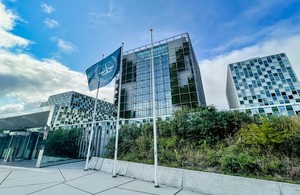Justice Secretary to offer support in investigating Russian war crimes in visit to The Hague
Deputy Prime Minister Dominic Raab will visit the International Criminal Court (ICC) in The Hague on Monday to offer practical support from the UK for investigating and prosecuting war crimes.

- Deputy Prime Minister Dominic Raab to visit the Hague on Monday
- Offer of UK legal expertise and technical support to the International Criminal Court
- UK to bring together broad coalition of countries to help war crimes investigations
The visit will also inform how the international community can best support the court as the Deputy Prime Minister vows to bring together a broad coalition of countries which also have the capability to help the investigation.
It follows a virtual meeting last week with Ukraine’s Prosecutor General, Iryna Venediktova, and Attorney General Suella Braverman to discuss what help the country needs to collect and preserve evidence of war crimes.
This is the latest in a series of efforts to provide Ukraine with economic, diplomatic, humanitarian and defensive support alongside lethal aid. The UK Government is also investigating how to stop Russian oligarchs using the British legal system to intimidate and silence their critics.
The Deputy Prime Minister will meet ICC Prosecutor, Karim AA Khan QC, its Registrar, Peter Lewis, and President of the Court, Judge Piotr Hofmański. He will emphasise UK support for the Court and respect for its independence.
Deputy Prime Minister, Lord Chancellor, and Secretary of State for Justice, Dominic Raab, said:
Tomorrow I will go to The Hague to offer the ICC UK technical support in bringing those responsible for war crimes in Ukraine to justice – including support with the immediate priority of gathering and preserving evidence.
Russian commanders carrying out war crimes should know they cannot act with impunity. Like Radovan Karadzic and Charles Taylor before them, their actions risk landing them in a jail cell.
Separately, Dominic Raab will meet ambassadors from a range of countries to build a coalition able to provide extra assistance and cooperation to the Office of the Prosecutor to investigate war crimes in Ukraine.
The UK has a long history of supporting war crimes prosecutions from Nuremburg through to the Yugoslav tribunals in the 1990s and was a founder member of the ICC.
The offer ranges from police and military analysis to specialist IT to help the ICC collect and preserve evidence, as well as the UK’s significant legal expertise. It might eventually lead to witness relocation and imprisoning those found guilty, as the UK has done for previous war crimes.
Separately, last week the Attorney General, Suella Braverman, signed a statement with the Ukraine’s Prosecutor General which reaffirms the UK’s support for holding Russia to account for war crimes committed in Ukraine.
The Deputy Prime Minister was the FCDO’s head of war crimes in the British Embassy in the Hague, liaising with the ICC from 2003 until 2006, supporting the prosecution of war crimes. In this role he negotiated agreements that have since allowed for witnesses to be relocated to safety in the UK and for those convicted to serve their sentences in UK prisons, including Radovan Karadžić who was found convicted of genocide in Bosnia at the International Criminal Tribunal for the former Yugoslavia in 2016.
He is leading a taskforce of Ministers, senior civil servants and operational partners such as the police and Crown Prosecution Service to establish how best the UK can support the ICC prosecute war crimes in Ukraine.